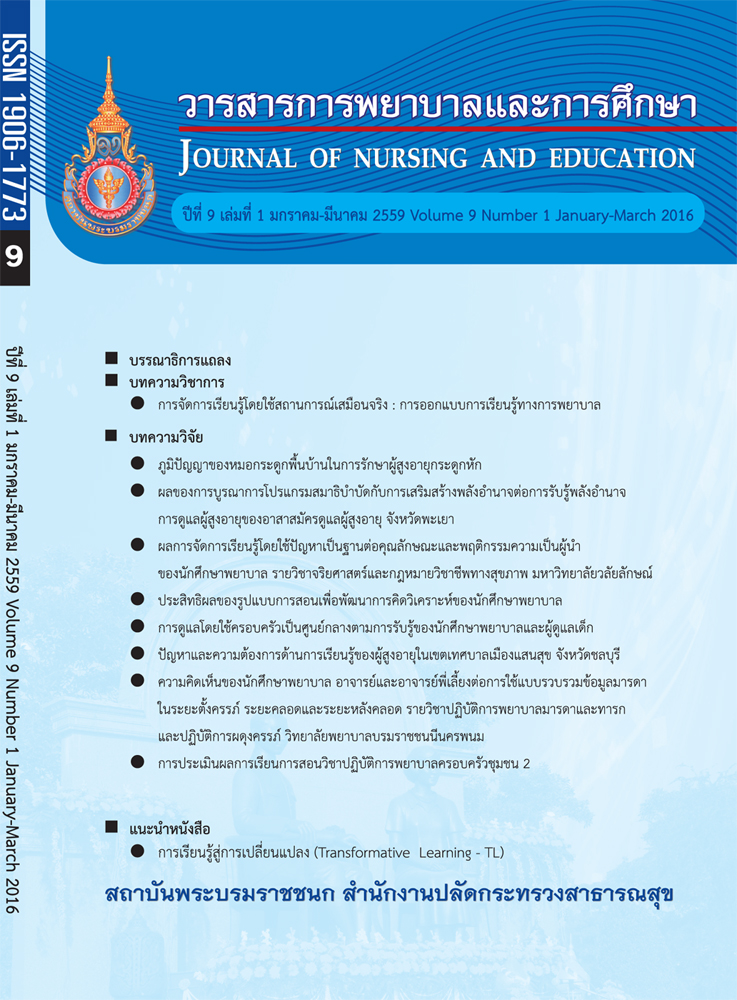ปัญหาและความต้องการด้านการเรียนรู้ของผู้สูงอายุในเขตเทศบาลเมืองแสนสุข จังหวัดชลบุรี
คำสำคัญ:
Educational Gerontology, Learning, Occupation, Elderlyบทคัดย่อ
บทคัดย่อ
การศึกษาเชิงสำรวจแบบภาคตัดขวาง มีวัตถุประสงค์เพื่อวิเคราะห์สถานการณ์ปัญหาและความต้องการด้านการเรียนรู้ของผู้สูงอายุในเขตเทศบาลเมืองแสนสุข จังหวัดชลบุรี กลุ่มตัวอย่างเป็นผู้สูงอายุที่จดทะเบียนรับเบี้ยยังชีพกับเทศบาลเมืองแสนสุขที่ยังประกอบอาชีพอยู่ จำนวนทั้งหมด 385 คน เก็บข้อมูลโดยการสัมภาษณ์ โดยใช้แบบสอบถามซึ่งประกอบด้วยข้อคำถาม เกี่ยวกับข้อมูลทั่วไปด้านประชากร อาชีพ และปัญหาด้านการเรียนรู้ของผู้สูงอายุ วิเคราะห์ข้อมูลโดยใช้สถิติพรรณนา ได้แก่ จำนวน ร้อยละ ค่าเฉลี่ย ส่วนเบี่ยงเบนมาตรฐาน ค่าสูงสุด ต่ำสุด และใช้สถิติอ้างอิงในรูปของการวิเคราะห์ความแปรปรวน (ANOVA) ผลการวิจัยพบว่า กลุ่มตัวอย่างเป็นเพศหญิงมากกว่าเพศชาย และมีอายุระหว่าง 60 – 84 ปี ส่วนใหญ่อยู่ในสถานภาพสมรสและมีระดับการศึกษา ในระดับประถมศึกษา งานในปัจจุบันที่ทำส่วนมากค้าขาย/ธุรกิจส่วนตัว รองลงมาคือ รับจ้างทั่วไป การทำงานในแต่ละวัน ส่วนใหญ่ทำงานวันละ 4 – 8 ชั่วโมง โดยส่วนใหญ่ทำงานเดือนละมากกว่า 20 วัน รายได้ต่อคนส่วนใหญ่อยู่ระหว่างเดือนละ 5,001 – 10,000 บาท ผู้สูงอายุส่วนใหญ่ไม่มีความรู้เกี่ยวกับแหล่งการเรียนรู้ (56.57%) และไม่เคยเข้าร่วมกิจกรรมการเรียนรู้เพื่อพัฒนาตนเอง (49.85%) ส่วนกลุ่มตัวอย่างที่ต้องการพัฒนาความรู้หรือทักษะในการทำงาน ต้องการพัฒนาความรู้และทักษะในการทำงานในด้าน ภาษาต่างประเทศ เช่น ภาษาอังกฤษ ภาษาอาเซียน คณิตศาสตร์ การพัฒนาธุรกิจ การพัฒนาอาชีพด้านต่างๆ ทักษะการทำงานให้มีประสิทธิภาพและมีรายได้เพิ่มขึ้น กลุ่มอายุ 60-64 ปี มีความต้องการด้านการเข้าร่วมกิจกรรมการเรียนรู้เพื่อการพัฒนาตนเองมากกว่ากลุ่มอายุอื่น กลุ่มอายุ 75 ปีขึ้นไปมีปัญหาด้านการเข้าร่วมกิจกรรมการเรียนรู้เพื่อการพัฒนาตนเองและด้านการฝึกนิสัยการเรียนรู้อย่างต่อเนื่องมากกว่ากลุ่มอายุอื่น กลุ่มอาชีพประมง และกลุ่มอาชีพรับจ้างทั่วไป มีปัญหาด้านการได้รับการพัฒนาทักษะในการเรียนรู้กว่ากลุ่มอาชีพอื่น ดังนั้นหน่วยงานที่เกี่ยวข้องจึงควรให้ความสำคัญกับการส่งเสริมสนับสนุนการเรียนรู้เพื่อการพัฒนาอาชีพ ให้กับผู้สูงอายุให้เพิ่มขึ้น โดยเฉพาะกลุ่มอายุ 60-64 ปี ที่มีรายได้น้อยและไม่มีรายได้เสริมซึ่งเป็นกลุ่มที่จำเป็นต้องได้รับการเรียนรู้เพิ่มเติมเกี่ยวกับการประกอบอาชีพเพื่อเพิ่มรายได้
คำสำคัญ: พฤฒาวิทยาด้านการศึกษา การเรียนรู้ อาชีพ ผู้สูงอายุ
Learning problems and needs among the elderly in Saen Suk Municipal area,
Chon Buri province
Abstract
This cross-sectional survey research aims to determine learning problems and needs among the elderly in Saen Suk Municipal area, Chon Buri province. The study subjects comprised 385 elderly people still working and registered to receive pension at Saen Suk Municipal area. Data were collected by interview which included questions on population and occupation characteristics, and learning problems. Percentages, means, standard deviations, minimum and maximum values were used to describe the data, and analysis of variance was employed to compare the differences between groups. The results revealed that the subjects were more female than male, between the ages of 60-84 years old, mostly married, and attained primary education. The subjects mostly worked in commercial and private businesses with the duration of 4-8 hours a day, and more than 20 days a month. Monthly income was 5,001 - 10,000 baht, and did not know learning sources (56.57%) nor participate in self-improvement activities (49.85%). However, those who wanted to improve knowledge or work skills reported that languages such as English and other ASEAN languages, mathematics, business and professional development, and work skill to increase income were areas that they wanted to improve. Different age group had differences in regards to the needs and problems of learning participation and continuous learning skill, in which the ages of 60-64 years old had the highest demand. Fishermen and general laborers had less access to work skill improvement services than other occupations. Different income had differences in regards to the need for continuous learning skill and support from the service providers. Thus, the relevant authorities should foster learning activities, especially among the age group of 60-64 years old, and those who had low and no supplementary income.
Keywords: Educational Gerontology; Learning; Occupation; Elderly






